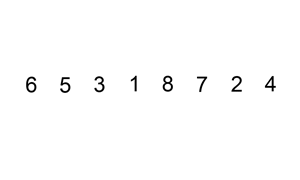147. Insertion Sort List
问题描述:
Sort a linked list using insertion sort.

A graphical example of insertion sort. The partial sorted list (black) initially contains only the first element in the list.
With each iteration one element (red) is removed from the input data and inserted in-place into the sorted list
Algorithm of Insertion Sort:
- Insertion sort iterates, consuming one input element each repetition, and growing a sorted output list.
- At each iteration, insertion sort removes one element from the input data, finds the location it belongs within the sorted list, and inserts it there.
- It repeats until no input elements remain.
Example 1:
Input: 4->2->1->3 Output: 1->2->3->4
Example 2:
Input: -1->5->3->4->0 Output: -1->0->3->4->5
解题思路:
插入排序的原理动图描述的很清晰,而用链表实现也很方便
需要外部一个指针,对每一个节点从头向后找可插入的位置
内部循环又需要两个指针来保护。
代码:
我的:
/** * Definition for singly-linked list. * struct ListNode { * int val; * ListNode *next; * ListNode(int x) : val(x), next(NULL) {} * }; */ class Solution { public: ListNode* insertionSortList(ListNode* head) { if(!head) return head; ListNode *p = head->next; ListNode *ppre = head; while(p){ ListNode *cur = head; ListNode *temp = p->next; ListNode *pre = NULL; while(cur->val < p->val){ pre = cur; cur = cur->next; } if(cur != p){ ppre->next = temp; p->next = cur; if(!pre){ head = p; }else{ pre->next = p; } }else{ ppre = p; } p = temp; } return head; } };
我发现别人在做的时候回自己添加一个dummy指针,这样不需要对是否是头节点进行判断,是个很好的办法
更快的:
class Solution { public: ListNode* insertionSortList(ListNode* head) { if(head == NULL || head->next == NULL) return head; ListNode* dummyhead = new ListNode(0); dummyhead->next = head; ListNode* cur = head; ListNode* pre = NULL; while(cur) { if(cur->next && cur->next->val < cur->val) { pre = dummyhead; ListNode* t = dummyhead->next; while(t && t->val < cur->next->val) { pre = t; t = t->next; } pre->next = cur->next; cur->next = cur->next->next; pre->next->next = t; } else cur = cur->next; } return dummyhead->next; } };




